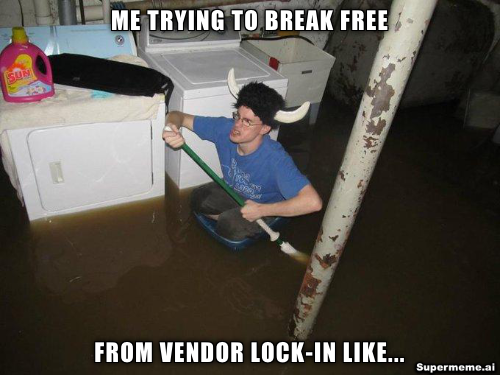Do you know how to ensure that you don't become dependent on a single IT partner (which can make switching to another provider very costly or even impossible)? By paying attention to a few (simple) factors, you can prevent long-term dependency. In this blog, you can read about what vendor lock-in is exactly and how to minimize its impact.
Vendor lock-in: with these four concrete tips, you can avoid dependency on your supplier

Written by Linda
What is vendor lock-in?
Imagine that you are looking for a custom-made platform. Eventually, you come across a company that promises great results at a good price, and they claim to deliver everything even faster than you expected. They work with a trendy new framework and have already achieved good results with it. You decide to go ahead with this company.
In an ideal situation, the company would fulfill its promises. They would create a beautiful platform within budget and on time, which they would maintain for years, enabling your business to grow successfully. However, what if the company takes much longer than anticipated, and the expected delivery date keeps getting pushed back every month? Or what if the platform turns out to be full of errors and issues instead of being fast and impressive? Switching to another developer could be an option, but there are situations where it can be very challenging. For example:
- Your current provider does not transfer the intellectual property rights of the software;
- You don't have access to the source code;
- The code's quality is so low that it cannot be further developed upon;
- Your developer has chosen a framework or language that is so "unique" that it becomes nearly impossible to find other parties with experience in it.
In such cases, you would be experiencing vendor lock-in: a situation where you, as the customer, have become dependent on a single supplier and cannot change suppliers without incurring significant costs or inconveniences.

Why is vendor dependency a problem?
If your supplier delivers good work, meets the agreements, and offers a reasonable price, then dependency by itself doesn't have to be be a problem. It only becomes a concern when that dependency leads to potentially higher costs, dissatisfaction with the quality or a lack of flexibility. Considering the vast number of companies providing custom software, as a customer, you actually have a relatively strong position. There are plenty of choices available, and you are not obligated to choose a provider that may be difficult to switch from later on. However, you need to know what to look out for.
With these 4 tips, you can avoid vendor lock-in
1. Make contractual agreements about ownership of components, data, licenses, and intellectual property
Is the code owned by you or the developer? Are aspects like hosting registered under your company's name, or are they managed by the development party? The more access and rights you have to everything being developed for you, the lower the chance that a developer can "hold your code hostage," so to speak.
2. Allocate time to familiarize yourself with the technological systems proposed by the developer
You don't need to know how to configure an endpoint in GraphQL, but it's important to understand that GraphQL is a popular open-source language used by many major companies such as Facebook, Spotify, GitHub, Pinterest, and Twitter. Finding another company with experience in GraphQL should not be difficult, and you don't have to worry about the teething problems of a new programming language. More information about GraphQL can be found here.
3. Develop an exit strategy
By considering an exit strategy from the beginning of the collaboration, you can make informed decisions. For example, think about the contract's duration and notice period. Don't forget to maintain and update this strategy throughout the collaboration.
4. Find an IT partner with shared values and principles
This list may start to resemble a "how to find the ideal date" guide, but the process of dating, whether between individuals or companies, shares similarities. If your company values speed and is willing to accept occasional errors, you may not be compatible with a developer who prioritizes meticulousness. Shared values and principles reduce the risk of being disadvantaged, especially in long-term relationships with your supplier.
Of course, the ideal scenario is to enter into a collaboration where both parties are highly satisfied. However, if for any reason that is not the case, these tips ensure that you can part ways with as few hurdles as possible. They help to safeguard a smooth separation between you and the vendor, minimizing potential difficulties.
